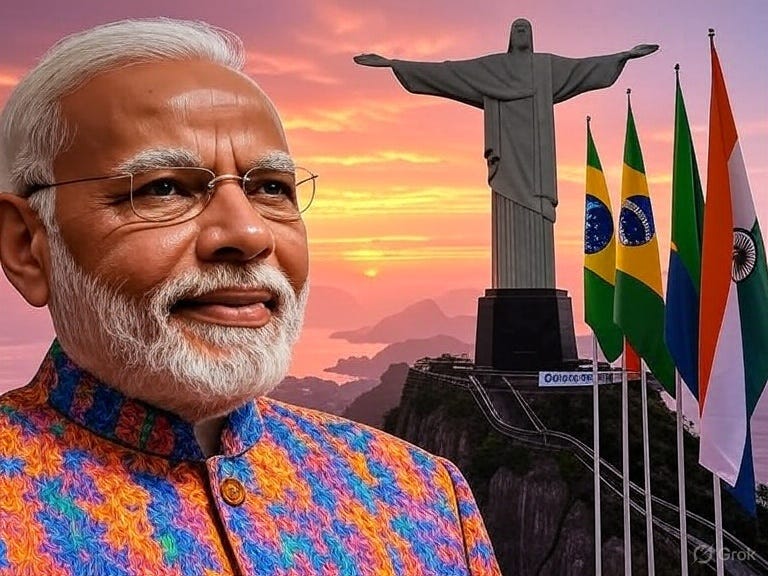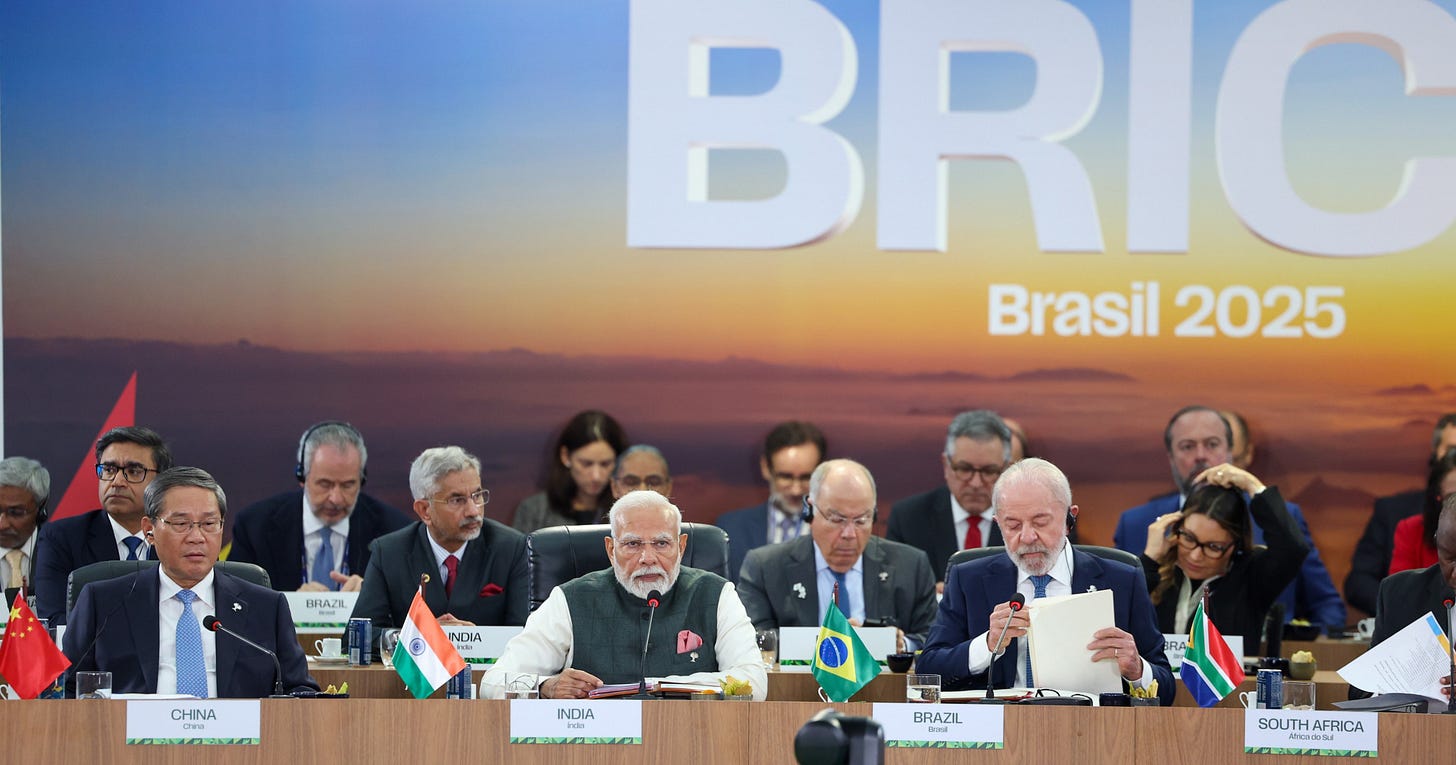PM Narendra Modi’s BRICS Masterclass in Rio de Janeiro— from Tightrope to Torch-Bearer
India set to host the 2026 BRICS Summit.
About the Author
KBS Sidhu, IAS (Retd.) served for four decades in the Indian Administrative Service, culminating as Special Chief Secretary, Punjab. He holds an MA in Economics from the University of Manchester and writes at the intersection of geopolitics, trade tariffs and India’s growing global influence.
Setting the Stage in Rio
The seventeenth BRICS summit opened in Rio, Brazil against a backdrop of tariff volleys, Middle-East flashpoints and a grinding war in Ukraine. Yet the leaders’ declaration emerged without a single dissenting note. That outcome was not accidental; it was the harvest of meticulous Indian diplomacy and the personal engagement of Prime Minister Narendra Modi.
PM Modi’s Tightrope Act on Tariffs
Days before the Summit, Washington threatened fresh duties on nations embracing what it called “anti-American” BRICS policies. India’s team insisted on language that condemned unilateral tariff hikes “inconsistent with WTO rules” rather than naming any country. The wording allowed Modi to defend an open trading order while preserving India’s deepening commercial dialogue with the United States.
Navigating the Iran–Gaza Fault-lines
West Asia was the trickiest terrain. By framing the text in humanitarian terms—“grave concern” over strikes on Iran and the Gaza crisis—New Delhi kept consensus intact without alienating either Tehran or Tel Aviv. The balancing act showed that moral clarity and strategic restraint need not be mutually exclusive.
A Measured Reference to Ukraine
On Europe’s war, the communiqué merely “recalled national positions on Ukraine”. The phrase, inserted by Indian drafters, offers each capital space to differ while keeping Russia within the consensus fold—a subtle but vital innovation.
Keeping the BRICS Currency Debate Alive
Brazil revived the idea of a common trade currency. India, wary of monetary unions, steered the discussion toward “mechanisms that reduce transaction costs”. The compromise preserves strategic autonomy yet keeps the de-dollarisation conversation alive for future study.
India–Brazil: A Partnership Energised by Rio
For host Brazil, India’s constructive role underscored a relationship that has expanded well beyond symbolism. The Strategic Partnership launched in 2006 now spans defence, space, biofuels and digital public goods. Bilateral trade has already crossed US $15 billion and both sides are aiming for US $50 billion by 2030, backed by cooperation in forums such as IBSA, the Global Biofuel Alliance and the G4 campaign for UN reform. Rio thus doubled as both a multilateral summit and a bilateral accelerator.
The Jaishankar Imprint: Diplomacy by Detail
External Affairs Minister S. Jaishankar’s advance team—an eclectic mix of economists, lawyers and security analysts—ran scenario drills, smoothing every contentious comma before leaders arrived. By the time Modi touched down, the rough edges had been filed away, enabling full signatures instead of footnotes.
Absences that Amplified Delhi’s Voice
Chinese President Xi Jinping skipped Rio entirely and Russian President Vladimir Putin appeared only via video link. Their absence inadvertently magnified PM Modi’s in-person diplomacy and reinforced India’s image as the indispensable bridge-builder of the Global South.
From Consensus to Chair: India’s Road to 2026
Brazil has now handed India the baton to chair the 2026 BRICS cycle. Modi signalled a year of deliverables under the theme “Resilience, Innovation and Sustainable Cooperation”, positioning New Delhi to translate summit prose into practical projects.
Answering the ‘Trojan Horse’ Canard
A handful of Western commentators claim India is a Trojan Horse in BRICS—courting Washington while sitting in the non-Western camp. The label wilts under scrutiny. It was PM Modi who famously observed, and Putin later quoted, that “BRICS is not an anti-Western alliance; it is simply non-Western.” The remark captures India’s ethos: inclusive, multi-aligned and allergic to bloc mentalities.
Conclusion – A Statesman at the High-Table
By placing sovereign interests above sabre-rattling, Prime Minister Narendra Modi walked the extra mile for consensus and emerged a statesman welcomed at the high-table of the comity of nations. As New Delhi prepares to host the next BRICS conclave, the world will watch whether this quiet, pragmatic diplomacy can keep an increasingly diverse bloc focused on growth, stability and peace.
PM Modi's Arrives in Kazan, Russia: BRICS on the Global Stage
PM Modi's Arrives in Kazan for the BRICS Summit






